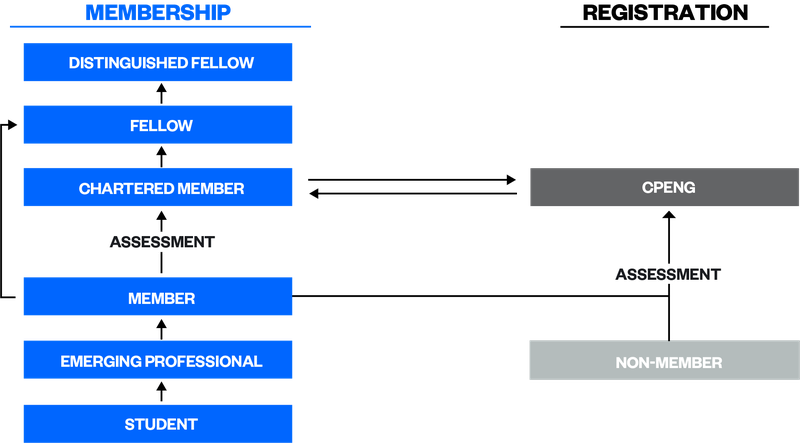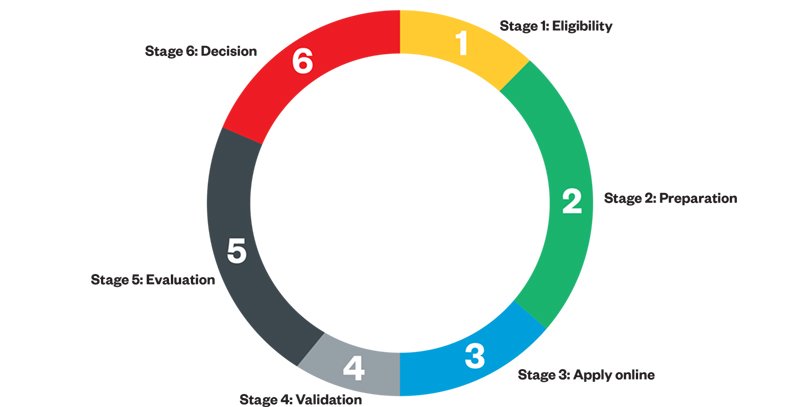Demonstrate your engineering expertise, commitment and ethical standards by becoming chartered.
The mark to set you apart
The gold standard
Establish yourself as an industry leader with a post-nominal that shows your level of engineering knowledge. You’ll open yourself up to new career opportunities by showing you’re a credible engineer that values professionalism, ethics and continual learning.
Global mobility
Mutual recognition of your engineering competence can help make it more straightforward to find work overseas – or having your skills recognised here in New Zealand. Gaining Chartership will show your knowledge meets internationally-benchmarked standards, and is among the best in the world.
Job requirement
To get to the next level in your career, Chartership may be a prerequisite. Many authorities and employers require engineers to be chartered in order to sign off certain work. Provide them with the assurance that you’re competent and one of the best engineers.
Your eligibility
All engineers can become chartered, and it’s easy with the same assessment applying to all. We offer different categories for professional, technologist, technician or geologist.
Professional Engineer
Complex engineering problems and activities
- Washington Accord (4 year BE) or equivalence
- Chartered Member
- IntPE(NZ)/APEC Engineer
- CPEng
- Recognised Engineer (Dam Safety)
- Design Verifier
Engineering Technologist
Broadly-defined engineering problems and activities
- Sydney Accord (3 year BEngTech) or equivalence
- Chartered Member (Eng. Technologist)
- IntET(NZ)
Engineering Technician
Well-defined engineering problems and activities
- Dublin Accord (2 year NZDE) or equivalence
- Chartered Member (Eng. Technician)
- IntETn(NZ)
Engineering Geologist
Complex engineering geological problems and activities
- Recognised postgraduate qualification in Engineering Geology
- Chartered Member (PEngGeol)
Mutual recognition
If you are currently registered as a Chartered Engineer with a professional body we recognise and wish to register as a Chartered Professional Engineer, you may be eligible to apply through the expedited Mutual Recognition Assessment pathway.
You must be able to demonstrate how you comprehend and apply your knowledge of accepted principles underpinning good practice for professional engineering that is specific to New Zealand. Please read through the guidance document for more information.
Knowledge assessment
Don’t have a Washington Accord-accredited qualification? You can demonstrate equivalent knowledge for entry into Professional Engineer (Chartered Membership or Chartered Professional Engineer) by completing a knowledge assessment.
Don’t have a Sydney or Dublin Accord-accredited qualification? Your equivalent knowledge will be evaluated as part of your chartership assessment.
Membership or registration?
There're two ways to become Chartered as a professional engineer – through Engineering New Zealand membership as a Chartered Member (CMEngNZ) or through registration as a Chartered Professional Engineer (CPEng). Our Chartered Member class provides a general quality mark of professionalism along with all the benefits of membership. CPEng registration provides a mark of current competence based on legislation. You can be both a Chartered Member and CPEng, or just one.

Which is right for you?
|
Chartered Professional Engineer (CPEngNZ) Registration |
Chartered Member of Engineering New Zealand (CMEngNZ) |
|---|---|
|
Chartered Professional Engineer (CPEngNZ) Registration Assesses engineering competence to an internationally recognised standard, with current New Zealand specific competence. |
Chartered Member of Engineering New Zealand (CMEngNZ) Quality mark of general competence and professionalism, assessed to an internationally recognised standard. |
|
Chartered Professional Engineer (CPEngNZ) Registration Re-assessed at least every six years. Commits to the CPEng Code of Ethical Conduct. Meets annual CPD requirements. |
Chartered Member of Engineering New Zealand (CMEngNZ) Assessed once, with annual commitment to ongoing professional development and ethics. |
|
Chartered Professional Engineer (CPEngNZ) Registration May be required if your work involves signing off consents, or certifying work under a New Zealand regulatory regime. Only CPEngs may sign Producer Statements in New Zealand |
Chartered Member of Engineering New Zealand (CMEngNZ) More accessible for engineers practising overseas, and provides direct entry for engineers who have been assessed in an equivalent overseas jurisdiction – e.g. CEng (UK), CPEng (Australia) or PEng (USA). May not sign Producer Statements in New Zealand |
|
Chartered Professional Engineer (CPEngNZ) Registration New Zealand engineering work experience is required to apply. Must cover understanding of current New Zealand good engineering practice, as well as showing current competence. |
Chartered Member of Engineering New Zealand (CMEngNZ) You can be assessed for Chartered Member first, and complete a significantly shorter assessment to apply for CPEng, once you have New Zealand engineering work experience. |
|
Chartered Professional Engineer (CPEngNZ) Registration Annual registration fee is $506 + GST. CPEng year is 01 January – 31 December |
Chartered Member of Engineering New Zealand (CMEngNZ) Annual membership fee is $560 + GST (or $430 if you live overseas). The membership year is from 01 October – 30 September |
The assessment process

1. Join our community
Not a member yet? Join us and get access to our online member area to record all your work and CPD records that will help build your portfolio of evidence for your Chartership application. If you don’t want to become a member, you will need to add your evidence when you complete your Chartership assessment to become CPEng.
2. Create work and CPD records
Start adding work and CPD records as soon as you join, so you don’t forget the details. Adding records as you go will make it quicker and easier to complete your Chartership application. Your work records provide evidence of your work history and build a picture of the type of engineering activities you carry out. Your CPD records could include formal education, courses, workshops, conferences, Engineering New Zealand branch or group activities, mentoring or volunteering. These all provide evidence of your ongoing professional development and count towards Engineering New Zealand members’ requirement to complete 40 hours of CPD each year.
3. Start your application
Before starting your application, check out our assessment guidance page and familiarise yourself with the document(s) that are relevant to the category you will be applying for.
When you’ve got enough experience to meet the engineering complexity requirements for Chartership, you can start your application. You’ll need to:
- Complete some details about you and the practice fields you want to be assessed for, and upload a current CV
- Supply two referees that can recommend you for Chartership
- Show how you meet the areas of competency
- Link relevant work and CPD records as evidence of your competence
When preparing your application, it's important you think about which field(s) you will be applying for, noting that the number of fields you apply for has implications for your annual hourly commitment to CPD.
4. Submit your application
Once you’ve completed all sections of the application, you’re ready to submit it to us. Our team will check you have everything you need in it, before it goes for evaluation with our assessors. As part of their evaluation, there will be an in-person session and your assessors may set you a task to find out more about your experience and knowledge. They will give a recommendation on whether you should receive Chartership, and then a Board make a final decision.
Track your employees' progress through Chartership
Download the checklist to help you track your employees' progress through the chartership process. Feel free to add more rows etc to incorporate your own internal business processes.
Fees and charges
See our fees page for the most up to date fees.
Find out more about career breaks
Post nominal
|
Chartered Member |
CMEngNZ |
|
Chartered Member (Engineering Technologist) |
CMEngNZ (Engineering Technologist) |
|
Chartered Member (Engineering Technician) |
CMEngNZ (Engineering Technician) |
|
Charter Member (Engineering Geologist) |
CMEngNZ (PEngGeol) |
|
Chartered Professional Engineer |
CPEng |
|
Recognised Engineer – Potential Impact Classification |
RecEng PIC |
|
Recognised Engineer – Dam Safety Assurance Programme |
RecEng DSAP |
Need help?
Our Chartership Team are here to give you advice on the process and your application. Email assessment@engineeringnz.org

